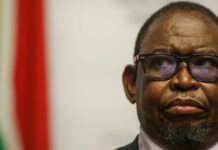
[miningmx.com] — BUSINESS leaders attending the ANC’s policy
conference last week appealed for certainty and warned that a lack of clarity could
lead to a plunge in business confidence and lack of investment in the economy.
As the pool of R1.2 trillion private-sector deposits rises and the ANC policy
conference defers concrete policy details to its Mangaung conference in December,
South African business is calling for certainty.
This happened against the backdrop of much horse-trading on the tone, nature and
naming of the ruling party’s much touted “second transition’ document.
By the end of the conference on Friday, consensus was apparently arrived at and
symbolised by the renaming of the contentious document, which will now be called
The Second Phase of the Transition document.
On the fringes of the often heated debate, business leaders warned that corporate
deposits are large and stand at almost R1.2 trillion – with households contributing
R568bn, corporations R154bn, and insurers and pensions yielding R152bn to these
retained earnings.
Business leaders said that for these amounts of money to find their way into the
economy, there needed to be clear policies, programmes and projects in which to
invest.
Corporate leaders stressed the need for urgency, as investment funds could find
themselves avenues for growth elsewhere on the African continent otherwise.
These views echoed concerns expressed earlier this year by all three of the ratings
agencies involved in the international credit rating of South Africa – Moody’s, Fitch
and Standard & Poor’s.
These have all revised South Africa’s credit rating downwards, citing low growth,
unemployment and policy uncertainty.
Black Business Council leader and mining industry player Sandile Zungu said that
his constituency welcomed the general recognition that the state needs to play a
part in the economy. He said that the private sector should increase its investment
levels and assist the state to meet its socioeconomic goals.
“The cautious approach of the private sector is understandable. Government needs
to provide clarity and announce an implementation plan. It must announce a slew of
projects that offer reasonable returns to private-sector investors,’ said Zungu.
“These must not be wishy-washy plans but well thought through projects that have
been subjected to rigorous research and planning,’ he said.
Bheki Sibiya, the chief executive of the South African Chamber of Mines, told
City Press the chamber would soon be sitting down with the ANC to gain a
deeper understanding of the exact implications of the resolutions of the policy
conference.
He said: “We will be going into bilateral discussions about the resolutions so we can
digest the meaning of these for businesses.’
According to Sibiya, business represented by the chamber understood the need for
change. “There is a need for change and transformation in the economy but this
must not be at the expense of jobs or growth,’ he said.
Leaders of South African banks, telecoms companies and mining companies were
highly visible at the conference in Midrand, Gauteng, last week. They indicated that
the private sector would only partner government in its planned R845bn
infrastructure spending when government provides clarity on its approach to South
Africa’s key economic challenges.
This week, business representatives complained that the ANC discussion document
on economic transformation was not yet concrete, but a discussion of the economic
growth options the country faces.
They said clarity was sorely needed and pointed to examples of regulatory clarity
provided by Malaysia, Singapore and Botswana in their economic transformation
programmes.
An often-cited example is that of Malaysia, which specifically targets a gross national
income of $523bn (R4.2 trillion) by 2020 – and has planned for a per capita income
rise from $6,700 in 2010 to at least $15,000 in the same time period.
This is concretely explained in their economic transformation plan, which specifically
explains what the private sector must achieve. Malaysia has announced 19 key
projects earmarked for private-sector investment.
Last week, debate at the ANC conference pivoted around the discussion document
titled The Second Transition – Building a National Democratic Society and the
Balance of Forces in 2012.
This document was prepared by the ANC policy unit and endorsed by the party’s
national executive committee.
The document contains suggestions about boosting job creation through
infrastructure development and the improvement of South Africa’s manufacturing
base. It envisages increasing investment levels throughout the economy by inducing
more private-sector participation in joint public-private sector projects.
The document asserts that through localising the manufacturing of products in the
mining industry, South Africa will increase productivity, boost GDP and reduce
unemployment.
But business people assert that the proposals are vague and have expressed concern
that the discussions on the direction of the economy were being linked to President
Jacob Zuma’s bid for a second term in office. At a press conference on Thursday,
Radebe said the document had been considered on its own merits and that it was not
related to Zuma’s re-election bid.
– City Press








